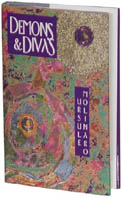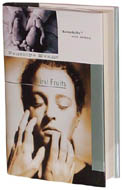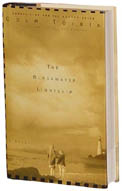|
In Demons & Divas, Ursule Molinaro invites her readers to enter a strange, uncomfortable world, settles them down, and then promptly kicks them out. The first and most engaging story, "Angel on Fire," is a multi-layered read, incorporating mythology, gender roles, and a little girl who is much scarier than the " I see dead people" kid. A Sicilian-born classics scholar gives birth to a child that she is unable to love. The daughter in question is born with a perfectly formed goat's hoof, possesses supernatural powers that she freely uses to hex those around her, and winds up graduating with a law degree from Harvard by the time she is six years old. Oh, and she's the devil (thus the goat's hoof). Molinaro ends the story in a grotesque and unexpected twist that leaves its readers both repulsed and craving more. The second story, "Saint Boy," takes the form of a hagiography (the writing or study of saints' lives) and consists of 20 letters from different people describing their relationships to a modern day (soon-to-be) saint from California whose questionable qualities are defended in a hilariously preposterous, yet always imaginative, style. The final entry, "April in Paris," is told from the perspective of an American artist and musician living in Paris whose husband has died and whose dying wish is to return to her roots in Virginia after a fifty year absence. Real proof of the old adage "you can never go home again" is offered amidst a level of dysfunction that rivals even the best of Woody Allen. Molinaro is like a fiery cocktail: two parts Greek mythology, one part religion, a dash of sex - pour over an ensemble of extraordinary characters and shake until your teeth are jarred. Drink immediately. -Eloise Campbell
Kate Carr has it, the ability to manipulate and control; the ability to know what one is thinking and feed on their weaknesses. This doesn't really come naturally however, she gets it from her father. Keith Carr is the most beloved man in Edinburgh, the minister who has everyone convinced he is the last stop, the one who decides who is chosen and who is doomed. Kate is being groomed to take her place by his side, to team with him in this undertaking to help poor souls. Penelope Evans' third novel, First Fruits, is a long, winding trip into the warped and damaged mind of 14-year-old Kate, locked in the stranglehold of her father and his way of life. "A good shepherd will bring every one into his fold, right down to the last lost sheep. In fact, it's that last sheep which is the most important, the one that poses the challenge ... No one gets past Dad." The way in which Kate describes her own father only adds depth to the distrust readers already feel for this man from the start of the novel. Evans takes the reader into Kate's mind where one learns the horrid ways she rationalizes life with this man and how she justifies her own manipulation of people. Despite her outward shows of contentment, Kate is haunted by dreams of her father, dreams of something long forgotten, something which suggests that not everything is as it may seem. Evans builds the plot and twists the story until it can hold no more, then in one night of revelation and remembrance, all comes to light. Readers will not be so much surprised as they are vindicated upon reading the last pages. Evans' brand of suspense is a keeper. -Christina Dwiggins
To take on the issues that he does in his book, The Blackwater Lightship, Colm Tóibín has to write with an unwavering hand. He looks AIDS and the sickness that results from it in the face, bringing the grim reality home to the reader. The main story of the book, though, is the characters, three generations of a family that come together and witness AIDS as it eats away at Declan, brother to Helen, son to Lily, and grandson to Mrs. Devereaux. What makes the reunion interesting, though, is that the women don't really get along - proud women with impressive memories. And they all converge on the small town of Cush and hole up in Mrs. Devereaux's old house on the Irish coast. Two of Declan's friends join the group to add more tension to the mix. Tóibín uses Declan and his worsening condition to bounce situations off the characters and to reveal the history and the personality of each, slowly thawing their frigid demeanors. But Tóibín never loosens his grasp on any of the characters too much; they never let themselves go, and sarcasm becomes their substitute for joy. Which makes the story all the more believable. Sickness and death inevitably bring people together, but even the possibility of loss can't force a hardened woman to love a mother she can't forgive. And though Tóibín never brings much personality to Declan himself - understandably, a person as sick as he won't have much to say - he manages to subtly and without frills develop a mix of complex characters that will undoubtedly satisfy. -Steven Tweddell
|
||
|
|
 DEMONS & DIVAS
DEMONS & DIVAS  FIRST FRUITS
FIRST FRUITS  THE BLACKWATER LIGHTSHIP
THE BLACKWATER LIGHTSHIP